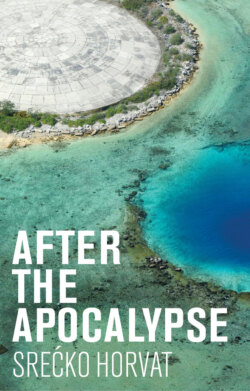After the Apocalypse

Реклама. ООО «ЛитРес», ИНН: 7719571260.
Оглавление
Srećko Horvat. After the Apocalypse
Table of Contents
List of Illustrations
Guide
Pages
After the Apocalypse
Copyright Page
Acknowledgements
Epigraph
Note
Introduction: Nine Theses on Apocalypse
The Apocalypse already happened
Apocalypse as revelation
The struggle for meaning
Post-apocalyptic melancholy
‘Normalization’ of the Apocalypse
Eschatological tipping points
Extinction is ‘supraliminal’
Time beyond ‘progress’
Another end of the world is still possible
Notes
1 Climate Crisis: Back to the Future Mediterranean
On the importance of wind
Solastalgia for the Mediterranean
‘Normalization’ of the Apocalypse
Death of Venice
Notes
2 The Nuclear Age: ‘Enjoy Chernobyl, Die Later’
‘Cloud that stopped at the border’
The obsolescence of ‘ruin value’
Commodification of the Apocalypse
Supraliminal radioactivity
Notes
3 The Collision: Marshall Islands Are Everywhere
‘The ontological Garden of Eden’
The collision of the nuclear age and climate crisis
The twenty-first-century pyramids
Time beyond progress
Notes
Postscriptum: ‘Revelation’ of COVID-19
‘Wuhan is everywhere’
Eschatological tipping points
The revolution of breathing
Notes
Soundtrack
POLITY END USER LICENSE AGREEMENT
Отрывок из книги
Srećko Horvat
This book started its life long before the current COVID-19 pandemic and the acceleration of catastrophes throughout the world, including climate crisis, civil wars and the enduring nuclear threat that are turning extinction not into a future event that is yet to come, but into something that might already become history once this book is published. If one day in March 2018 I hadn’t met Tigran Haas in Stockholm, this book would perhaps never be written. I was invited by Tigran to deliver a lecture at the Center for the Future of Places at the KTH Royal Institute of Technology and immediately afterwards he told me I must write a book that would explore the ‘future of places’ in relation to the Apocalypse. Thanks to him and the generous support of the Center for the Future of Places, I decided to dive into this abyss and examine both the spatial and temporal implications of the Apocalypse. Only through numerous thoughts, dreams and fears shared with my fellow travellers, my suputnik(s) or sputnik(s), did this book take its current shape. Perhaps a more precise term would be supatnik (‘fellow sufferer’), as they had to endure my endless obsession with the ‘end’ and the ‘after’. First and foremost, my thanks goes, as always, to Saša Savanović, not only for her critical comments and numerous readings, but also for making the world ‘after the Apocalypse’ a more joyful and hopeful place. Among my fellow travellers, whose list is long and always incomplete, those who especially helped in this endeavour are Franco ‘Bifo’ Berardi, Yanis Varoufakis, Darko Suvin, Boris Buden, Renata Ávila, Judith Meyer, Maja Kantar, Andrej Nikolaidis, Marko Pogačar, Valerio Baćak and Filip Balunović. This book was finished in the midst of a pandemic which, once again, proved that ‘politics of friendship’ is always connected to survival – and resistance.
.....
fiction section
has been moved to
.....